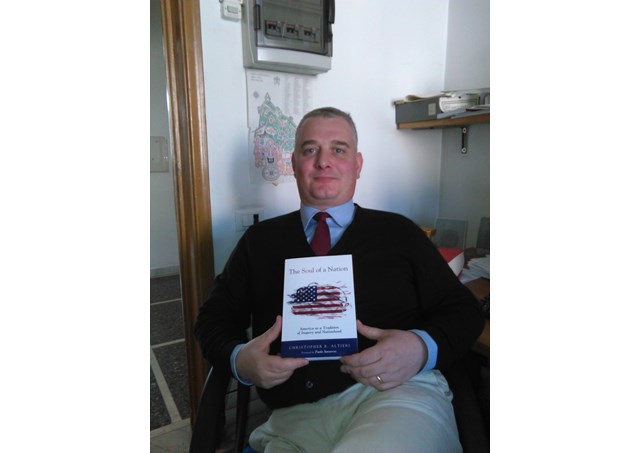
New book explores intellectual, religious origins of U.S.

(Vatican Radio) Vatican Radio’s Chris Altieri has written a book exploring the intellectual milieu of the founding generation of the United States, and tracing the peculiar way of thinking that was present in that generation through the history of the country. The Soul of a Nation: America as a Tradition of Inquiry and Nationhood (236 pages, Wipf & Stock Publishers, 2015) is an original, painstakingly non-polemical look on perennial themes, including vexing public questions such as the nature of marriage and the limits of government. The book introduces general readers to some little-known giants of 20th century intellectual life, making their work accessible by weaving discussion of their thought into and through iconic cultural figures and artifacts.
We spoke with the author, asking him who he thinks should read this book? “I think political philosophers in general can and should engage with it – even if only to tell me that I’m all wet,” Altieri said. “I take some pretty big swings at some tough nuts here, standing traditional readings of [third president and principal draftsman of the Declaration of Independence] Thomas Jefferson on their head, to name one,” he continued, “and I tackle some of the last century’s – and this century’s too – intellectual A-listers, and I think I do so in a fun and engaging way. I also spend a great deal of time with well-known and easily recognizable cultural figures and artifacts, like baseball, Hollywood films, and of course the founding documents of the United States. Any reader willing to take the time to wade through the more difficult, technical parts – of which there are a few, but not too deep or miry – will be glad for having done so.”
Click below to hear Charles Collins’ extended conversation with colleague and author, Chris Altieri
What was the most challenging part of writing the book? “First, that I had to explain and ‘sell’ America to an audience of professional European academics. The book is essentially my PhD dissertation, which I did at the Pontifical Gregorian University. That part of the project consisted primarily in developing a constant awareness of my own, and my audience’s often uncritically accepted and even unconsciously operative presuppositions about a whole host of things. Then, I was constantly being made aware of what America ‘looks like’ from the outside, and I started developing the idea that I would have to do justice to that perception – to take it seriously, as though there really was something my European friends and colleagues could see, that I couldn’t – and then I had to ‘translate’ that perspective into something that would be intelligible from within and from without.”
Asked what he would like readers to take away from this book, Altieri said, “The first,” he said, “is that professionals – professional academics – realize that we have to be more aware of how our history works on us in the present; second, I like to think that the book goes some way to showing the real depth and richness of American popular culture – there’s a great deal more to American popular culture than most of us realize, if only we might learn how to inhabit that culture. I would add that the caveat about there being more to popular culture than many professional academics and ‘high culture’ devotees tend to realize, is one that cuts the other way, as well: general readers should know that there is serious thinking and serious living – if I can put it that way – going on in professional academic life, and having an awareness of that, an appreciation for it, ought not automatically impugn one’s ‘street cred’ – and finally, I hope folks come away from this book wanting more from where it came from!”
| All the contents on this site are copyrighted ©. |


